The Libyan Civil War: An Analysis of Impact on the Population
VerifiedAdded on 2023/04/20
|5
|1001
|264
Report
AI Summary
This report examines the impact of the Libyan civil war, inspired by the Arab Spring, on the common population of Libya. It highlights the dire consequences faced by civilians, including lack of access to basic necessities like safe drinking water, healthcare, and education, as well as mass displacement and the rise of slave trade. The report emphasizes the role of international intervention and the resulting power struggles between opposing government groups, funded by external actors. It suggests that foreign influence should be removed to allow Libyans to make their own choices and calls for accountability for human rights abuses, while also acknowledging the complexities arising from Libya's significant oil reserves and the vested interests of developed nations. The report concludes by urging the world leaders to address the atrocities.
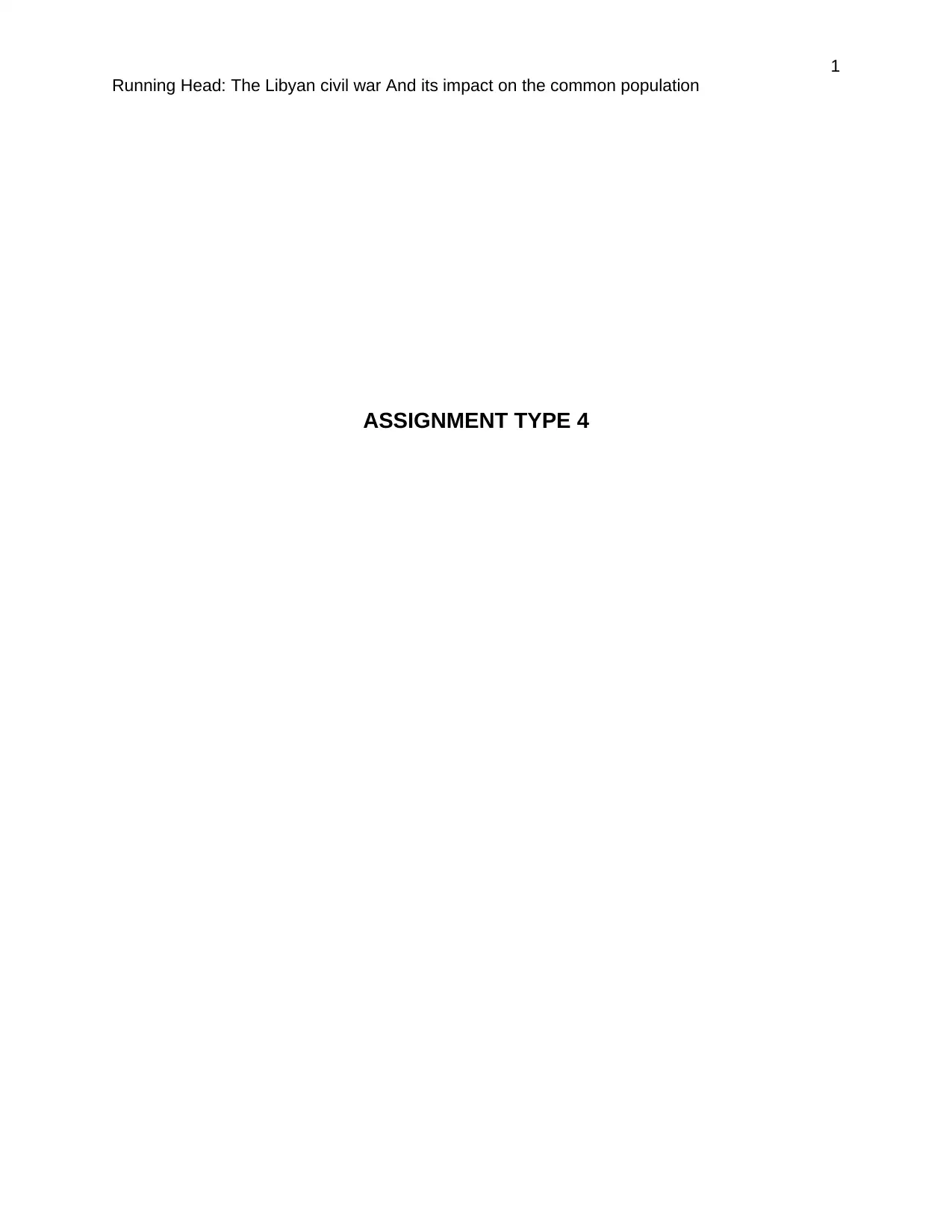
1
Running Head: The Libyan civil war And its impact on the common population
ASSIGNMENT TYPE 4
Running Head: The Libyan civil war And its impact on the common population
ASSIGNMENT TYPE 4
Paraphrase This Document
Need a fresh take? Get an instant paraphrase of this document with our AI Paraphraser
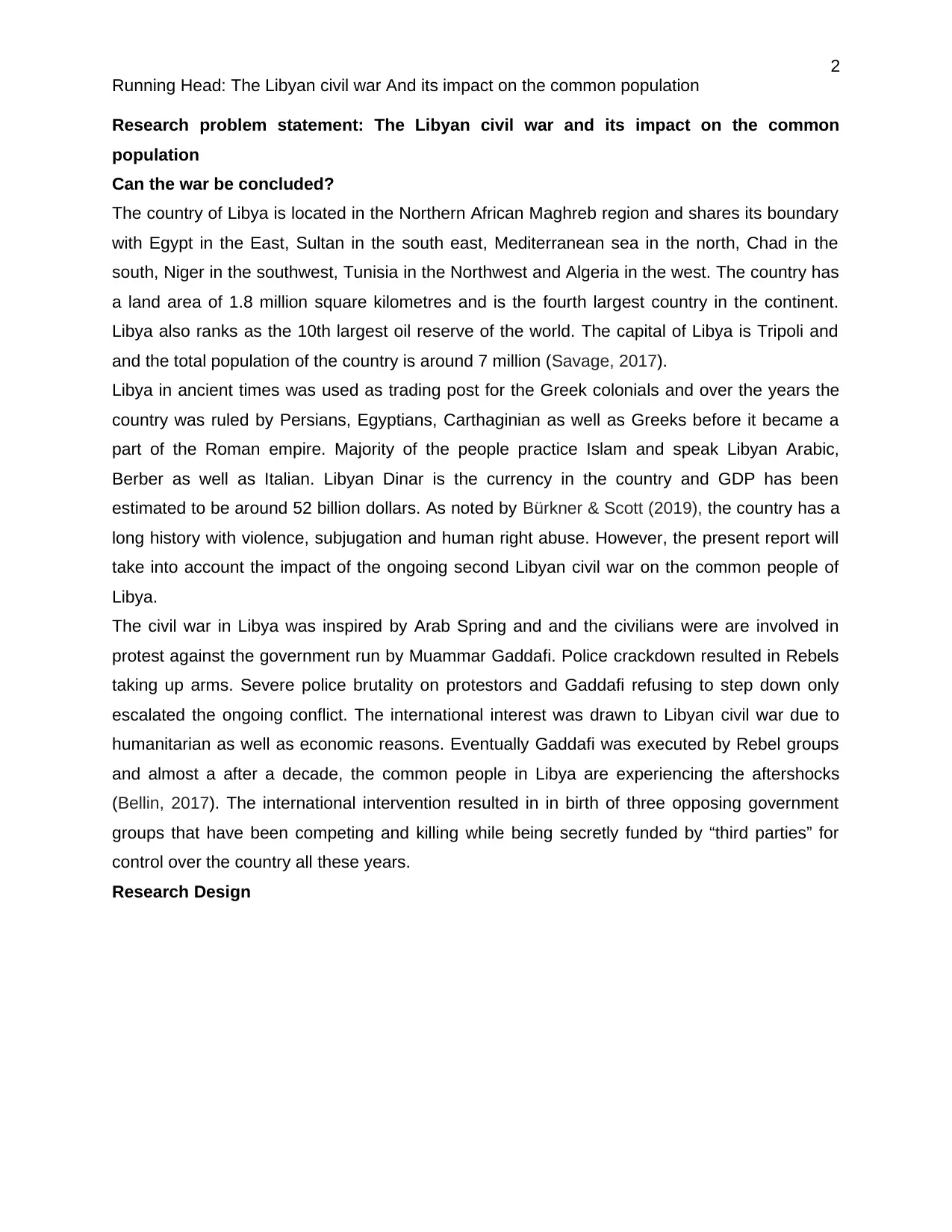
2
Running Head: The Libyan civil war And its impact on the common population
Research problem statement: The Libyan civil war and its impact on the common
population
Can the war be concluded?
The country of Libya is located in the Northern African Maghreb region and shares its boundary
with Egypt in the East, Sultan in the south east, Mediterranean sea in the north, Chad in the
south, Niger in the southwest, Tunisia in the Northwest and Algeria in the west. The country has
a land area of 1.8 million square kilometres and is the fourth largest country in the continent.
Libya also ranks as the 10th largest oil reserve of the world. The capital of Libya is Tripoli and
and the total population of the country is around 7 million (Savage, 2017).
Libya in ancient times was used as trading post for the Greek colonials and over the years the
country was ruled by Persians, Egyptians, Carthaginian as well as Greeks before it became a
part of the Roman empire. Majority of the people practice Islam and speak Libyan Arabic,
Berber as well as Italian. Libyan Dinar is the currency in the country and GDP has been
estimated to be around 52 billion dollars. As noted by Bürkner & Scott (2019), the country has a
long history with violence, subjugation and human right abuse. However, the present report will
take into account the impact of the ongoing second Libyan civil war on the common people of
Libya.
The civil war in Libya was inspired by Arab Spring and and the civilians were are involved in
protest against the government run by Muammar Gaddafi. Police crackdown resulted in Rebels
taking up arms. Severe police brutality on protestors and Gaddafi refusing to step down only
escalated the ongoing conflict. The international interest was drawn to Libyan civil war due to
humanitarian as well as economic reasons. Eventually Gaddafi was executed by Rebel groups
and almost a after a decade, the common people in Libya are experiencing the aftershocks
(Bellin, 2017). The international intervention resulted in in birth of three opposing government
groups that have been competing and killing while being secretly funded by “third parties” for
control over the country all these years.
Research Design
Running Head: The Libyan civil war And its impact on the common population
Research problem statement: The Libyan civil war and its impact on the common
population
Can the war be concluded?
The country of Libya is located in the Northern African Maghreb region and shares its boundary
with Egypt in the East, Sultan in the south east, Mediterranean sea in the north, Chad in the
south, Niger in the southwest, Tunisia in the Northwest and Algeria in the west. The country has
a land area of 1.8 million square kilometres and is the fourth largest country in the continent.
Libya also ranks as the 10th largest oil reserve of the world. The capital of Libya is Tripoli and
and the total population of the country is around 7 million (Savage, 2017).
Libya in ancient times was used as trading post for the Greek colonials and over the years the
country was ruled by Persians, Egyptians, Carthaginian as well as Greeks before it became a
part of the Roman empire. Majority of the people practice Islam and speak Libyan Arabic,
Berber as well as Italian. Libyan Dinar is the currency in the country and GDP has been
estimated to be around 52 billion dollars. As noted by Bürkner & Scott (2019), the country has a
long history with violence, subjugation and human right abuse. However, the present report will
take into account the impact of the ongoing second Libyan civil war on the common people of
Libya.
The civil war in Libya was inspired by Arab Spring and and the civilians were are involved in
protest against the government run by Muammar Gaddafi. Police crackdown resulted in Rebels
taking up arms. Severe police brutality on protestors and Gaddafi refusing to step down only
escalated the ongoing conflict. The international interest was drawn to Libyan civil war due to
humanitarian as well as economic reasons. Eventually Gaddafi was executed by Rebel groups
and almost a after a decade, the common people in Libya are experiencing the aftershocks
(Bellin, 2017). The international intervention resulted in in birth of three opposing government
groups that have been competing and killing while being secretly funded by “third parties” for
control over the country all these years.
Research Design
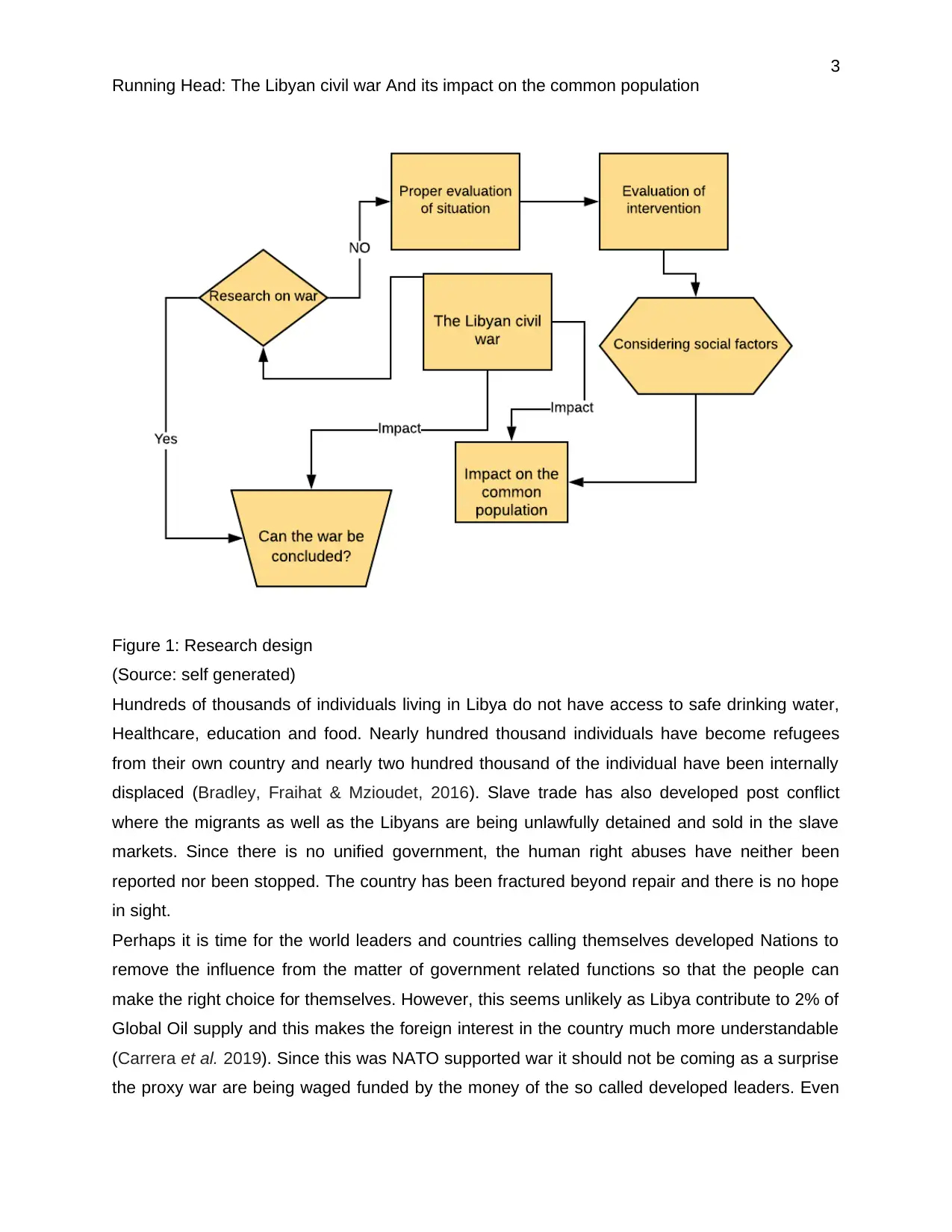
3
Running Head: The Libyan civil war And its impact on the common population
Figure 1: Research design
(Source: self generated)
Hundreds of thousands of individuals living in Libya do not have access to safe drinking water,
Healthcare, education and food. Nearly hundred thousand individuals have become refugees
from their own country and nearly two hundred thousand of the individual have been internally
displaced (Bradley, Fraihat & Mzioudet, 2016). Slave trade has also developed post conflict
where the migrants as well as the Libyans are being unlawfully detained and sold in the slave
markets. Since there is no unified government, the human right abuses have neither been
reported nor been stopped. The country has been fractured beyond repair and there is no hope
in sight.
Perhaps it is time for the world leaders and countries calling themselves developed Nations to
remove the influence from the matter of government related functions so that the people can
make the right choice for themselves. However, this seems unlikely as Libya contribute to 2% of
Global Oil supply and this makes the foreign interest in the country much more understandable
(Carrera et al. 2019). Since this was NATO supported war it should not be coming as a surprise
the proxy war are being waged funded by the money of the so called developed leaders. Even
Running Head: The Libyan civil war And its impact on the common population
Figure 1: Research design
(Source: self generated)
Hundreds of thousands of individuals living in Libya do not have access to safe drinking water,
Healthcare, education and food. Nearly hundred thousand individuals have become refugees
from their own country and nearly two hundred thousand of the individual have been internally
displaced (Bradley, Fraihat & Mzioudet, 2016). Slave trade has also developed post conflict
where the migrants as well as the Libyans are being unlawfully detained and sold in the slave
markets. Since there is no unified government, the human right abuses have neither been
reported nor been stopped. The country has been fractured beyond repair and there is no hope
in sight.
Perhaps it is time for the world leaders and countries calling themselves developed Nations to
remove the influence from the matter of government related functions so that the people can
make the right choice for themselves. However, this seems unlikely as Libya contribute to 2% of
Global Oil supply and this makes the foreign interest in the country much more understandable
(Carrera et al. 2019). Since this was NATO supported war it should not be coming as a surprise
the proxy war are being waged funded by the money of the so called developed leaders. Even
⊘ This is a preview!⊘
Do you want full access?
Subscribe today to unlock all pages.

Trusted by 1+ million students worldwide
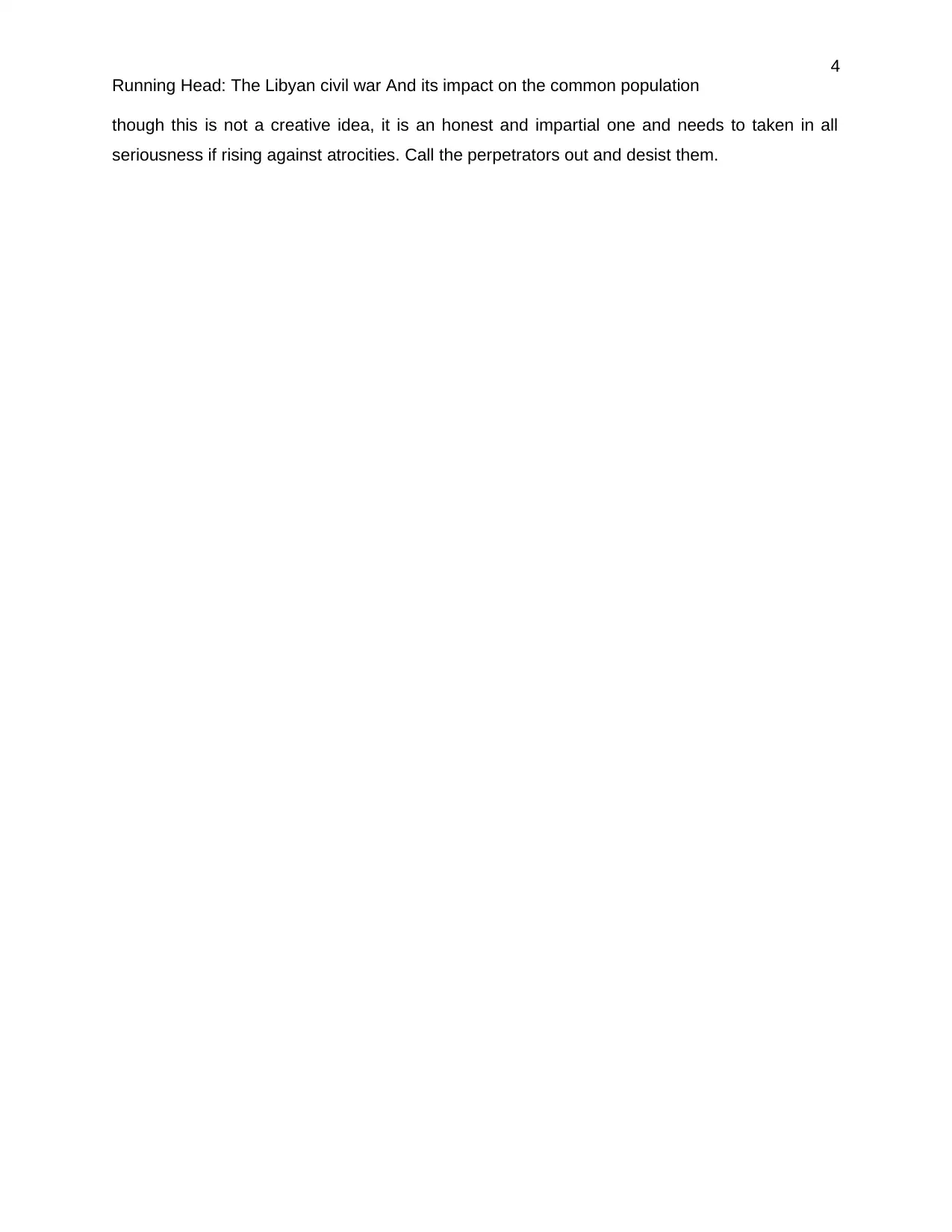
4
Running Head: The Libyan civil war And its impact on the common population
though this is not a creative idea, it is an honest and impartial one and needs to taken in all
seriousness if rising against atrocities. Call the perpetrators out and desist them.
Running Head: The Libyan civil war And its impact on the common population
though this is not a creative idea, it is an honest and impartial one and needs to taken in all
seriousness if rising against atrocities. Call the perpetrators out and desist them.
Paraphrase This Document
Need a fresh take? Get an instant paraphrase of this document with our AI Paraphraser
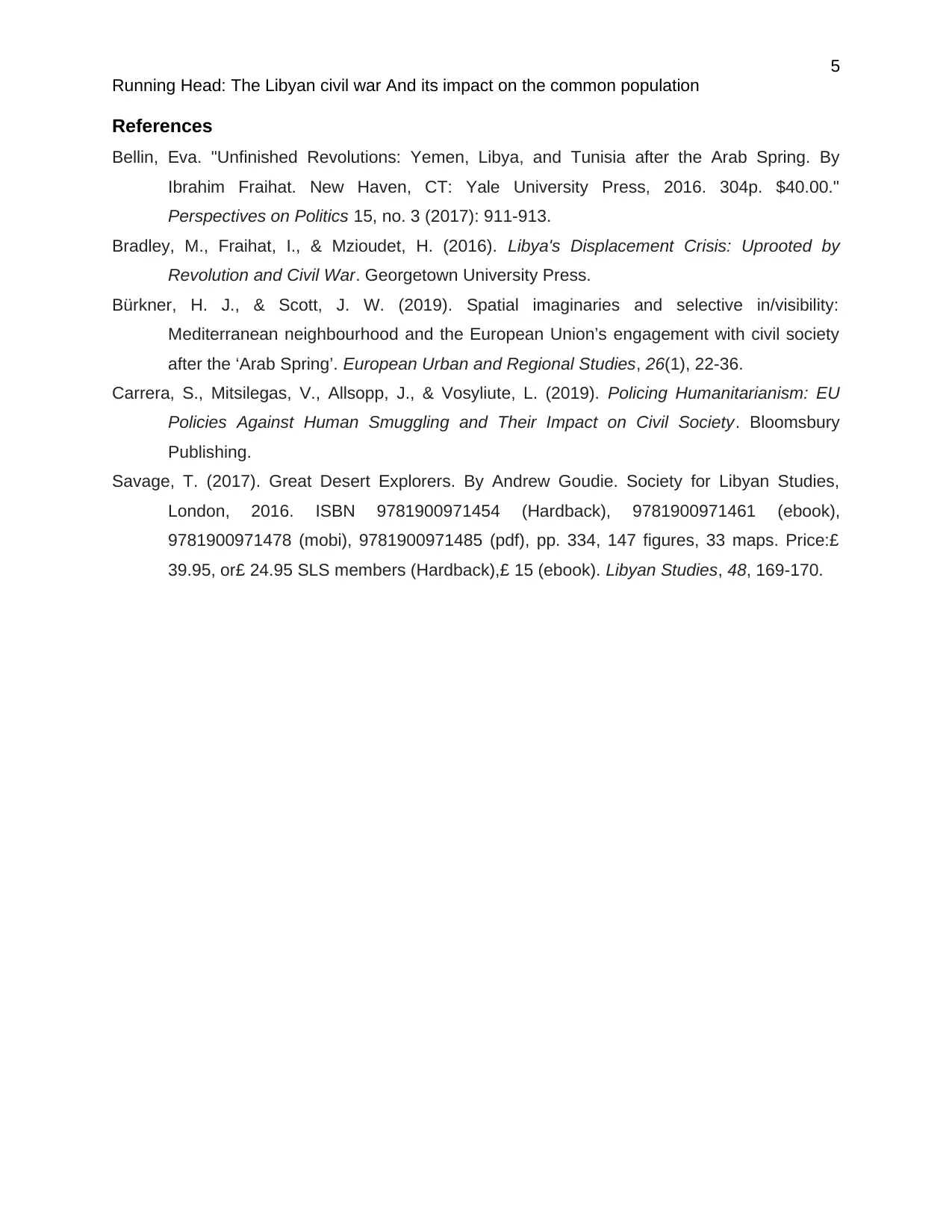
5
Running Head: The Libyan civil war And its impact on the common population
References
Bellin, Eva. "Unfinished Revolutions: Yemen, Libya, and Tunisia after the Arab Spring. By
Ibrahim Fraihat. New Haven, CT: Yale University Press, 2016. 304p. $40.00."
Perspectives on Politics 15, no. 3 (2017): 911-913.
Bradley, M., Fraihat, I., & Mzioudet, H. (2016). Libya's Displacement Crisis: Uprooted by
Revolution and Civil War. Georgetown University Press.
Bürkner, H. J., & Scott, J. W. (2019). Spatial imaginaries and selective in/visibility:
Mediterranean neighbourhood and the European Union’s engagement with civil society
after the ‘Arab Spring’. European Urban and Regional Studies, 26(1), 22-36.
Carrera, S., Mitsilegas, V., Allsopp, J., & Vosyliute, L. (2019). Policing Humanitarianism: EU
Policies Against Human Smuggling and Their Impact on Civil Society. Bloomsbury
Publishing.
Savage, T. (2017). Great Desert Explorers. By Andrew Goudie. Society for Libyan Studies,
London, 2016. ISBN 9781900971454 (Hardback), 9781900971461 (ebook),
9781900971478 (mobi), 9781900971485 (pdf), pp. 334, 147 figures, 33 maps. Price:£
39.95, or£ 24.95 SLS members (Hardback),£ 15 (ebook). Libyan Studies, 48, 169-170.
Running Head: The Libyan civil war And its impact on the common population
References
Bellin, Eva. "Unfinished Revolutions: Yemen, Libya, and Tunisia after the Arab Spring. By
Ibrahim Fraihat. New Haven, CT: Yale University Press, 2016. 304p. $40.00."
Perspectives on Politics 15, no. 3 (2017): 911-913.
Bradley, M., Fraihat, I., & Mzioudet, H. (2016). Libya's Displacement Crisis: Uprooted by
Revolution and Civil War. Georgetown University Press.
Bürkner, H. J., & Scott, J. W. (2019). Spatial imaginaries and selective in/visibility:
Mediterranean neighbourhood and the European Union’s engagement with civil society
after the ‘Arab Spring’. European Urban and Regional Studies, 26(1), 22-36.
Carrera, S., Mitsilegas, V., Allsopp, J., & Vosyliute, L. (2019). Policing Humanitarianism: EU
Policies Against Human Smuggling and Their Impact on Civil Society. Bloomsbury
Publishing.
Savage, T. (2017). Great Desert Explorers. By Andrew Goudie. Society for Libyan Studies,
London, 2016. ISBN 9781900971454 (Hardback), 9781900971461 (ebook),
9781900971478 (mobi), 9781900971485 (pdf), pp. 334, 147 figures, 33 maps. Price:£
39.95, or£ 24.95 SLS members (Hardback),£ 15 (ebook). Libyan Studies, 48, 169-170.
1 out of 5
Your All-in-One AI-Powered Toolkit for Academic Success.
+13062052269
info@desklib.com
Available 24*7 on WhatsApp / Email
![[object Object]](/_next/static/media/star-bottom.7253800d.svg)
Unlock your academic potential
Copyright © 2020–2025 A2Z Services. All Rights Reserved. Developed and managed by ZUCOL.

